Free Forum Q&A: RICK HANSON, author of Hardwiring Happiness
Written on December 31st, 2013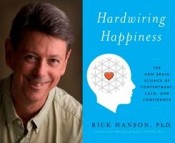 |
Aired: 12/29/13
My guest this week is RICK HANSON, neuropsychologist, and author of the best-seller BUDDHA’S BRAIN. We’re going to talk about his latest book, HARDWIRING HAPPINESS, where he brings together mindfulness and neuroscience and offers pro-active practices to actually shift the brain’s neural structure – the hardwiring – toward calm, contentment, and confidence.
This time of year can be challenging for people. Holidays bring us in contact with family, which for many carries a charge. We’re all asked to be more social than usual. We need a story to tell. And it feels natural to take stock and self assess at the end and beginning of a calendar year. We can be hard on ourselves.
Rick Hanson and I are going to talk about how you can use new lessons science is learning about the brain to overcome it’s — so far evolutionarily successful — negativity bias – the brain’s tendency to hardwire negative and threatening experiences more easily, more quickly than positive ones. It’s important that you avoid predators. And the ones who didn’t had fewer children.
Free Forum Q&A – DORIS KEARNS GOODWIN, Author of The Bully Pulpit Roosevelt vs Robber Barons
Written on November 19th, 2013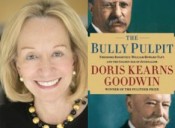 |
Aired: 11/17/13
The gap between rich and poor is huge and growing…legislative stalemate paralyzes the country…corporations fight federal regulations…the influence of money in politics is greater than ever…new inventions speed the pace of daily life.
Sound familiar? Those headlines from the early 1900s set the scene for Doris Kearns Goodwin’s new book The Bully Pulpit-a history of the first decade of the Progressive era – a time when courageous journalists and an ambitious president took on the Robber Barons – the 1% of their day – and won.
Goodwin tells the tale through the long friendship of Theodore Roosevelt and William Howard Taft – a relationship that serves both until it ruptures in 1912, when they engage in a brutal fight for the presidential nomination that cripples the progressive wing of the Republican Party and helps elect Woodrow Wilson.
Getting equal billing in her account is the golden age of journalism led by the muckraking press at McClure’s magazine. Together a bold and progressive press and a strong and progressive president served the people of the US rather than the super wealthy and the corporations. What lessons can we learn to help us turn this country around a century later?
Free Forum Q&A – JAY HARMON, Author of THE SHARK’S PAINTBRUSH: How Nature is Inspiring Innovation
Written on November 5th, 2013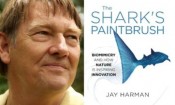 |
Aired: 11/3/13
Nature, imaginative by necessity, has already solved many of the problems we are grappling with. Animals, plants, and microbes are the consummate engineers. They have found what works, what is appropriate, and most important, what lasts here on Earth.
After 3.8 billion years of R&D on this planet, failures are fossils. What surrounds us in the natural world is what has succeeded and survived. So why not learn as much as
we can from what works?
This week’s guest, JAY HARMON is doing just that, translating nature’s lessons and models into technologies that solve problems and perform tasks more elegantly, efficiently, and economically. He’s the author of THE SHARK’S PAINTBRUSH: Biomimicry and How Nature is Inspiring Innovation. I believe biomimicry – a way of looking and working and designing – has enormous potential to save us from ourselves. I find this one of the most exciting developments in the world at this time.
Free Forum Q&A – RAFE ESQUITH Multi-award winning 29-year LA 5th grade teacher REAL TALK FOR REAL TEACHERS Advice for Teachers, From Rookies to Veterans: “No Retreat, No Surrender!”
Written on July 23rd, 2013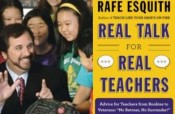 |
Aired: 07/21/13
This week we’ll spend the hour with RAFE ESQUITH, who’s been teaching fifth graders in LA’s Hobart Elementary public school for nearly thirty years. Now a teacher of teachers, he recently returned from doing that in China.
I first learned of Rafe’s work in 2005, when POV the PBS film series pitched me a documentary, THE HOBART SHAKESPEARIANS, about the full Shakespeare productions that his students – most from families where English is not the primary language – perform each year. The film was directed by MEL STUART, a wonderful director of at least two landmark films – the 1971 Willy Wonka & the Chocolate Factory with Gene Wilder and 1973’s WATTSTAX concert film of funky music and Black Power. Mel Stuart passed away a little less than a year ago. And he is missed.
In September 2005, introducing my interview with Rafe and Mel about the film , I said this: Documentaries may be giving us what we hunger for. March of the Penguins, Mad Hot Ballroom and The Hobart Shakespeareans are documentaries about goodness, dedication, and purpose, and whether penguins or fifth graders, they’re about respect and treating others well. Each of these films made me giggle, and each brought me to tears. There’s something joyfully and painfully touching when we see the life force in action with purpose. When so much is going wrong, from Iraq to New Orleans, I think we need to see these things.
Eight years later, Rafe Esquith continues to leads fifth graders at one of the nation’s largest inner-city grade schools through an uncompromising curriculum of English, mathematics, geography and literature. His classroom mottos are “Be nice. Work hard.” and “There are no shortcuts.” Despite language barriers and poverty, many attend outstanding colleges. Esquith expects the best from these kids no matter what their backgrounds, and he backs up that expectation by giving them the educational resources to defy the odds.
Q&A: Mark Mykleby, Natl Security=Sustainability
Written on April 8th, 2013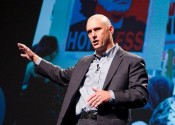 |
Aired: 04/07/13
In the preface to an article entitled A National Strategic Narrative, Anne-Marie Slaughter of Princeton says we need a narrative that confronts some of the following questions, “Where is the United States going in the world? How can we get there? What are the guiding stars that will illuminate the path along the way? We need a story with a beginning, middle, and projected happy ending that will transcend our political divisions, orient us as a nation, and give us both a common direction and the confidence and commitment to get to our destination.” She also writes, “In one sentence, the strategic narrative of the United States in the 21st century is that we want to become the strongest competitor and most influential player in a deeply inter-connected global system, which requires that we invest less in defense and more in sustainable prosperity and the tools of effective global engagement.”
Over time, the best way to shape the force of the future is to invest in the science, technology, education, and training that will equip our soldiers, sailors, airmen, and marines to adapt to an increasingly complex and dynamic environment. The hardware and software we buy and build are secondary to the gray matter we must cultivate now.
When I hear that someone high up in the military is talking seriously about sustainability, I take notice.
www.newamerica.net
